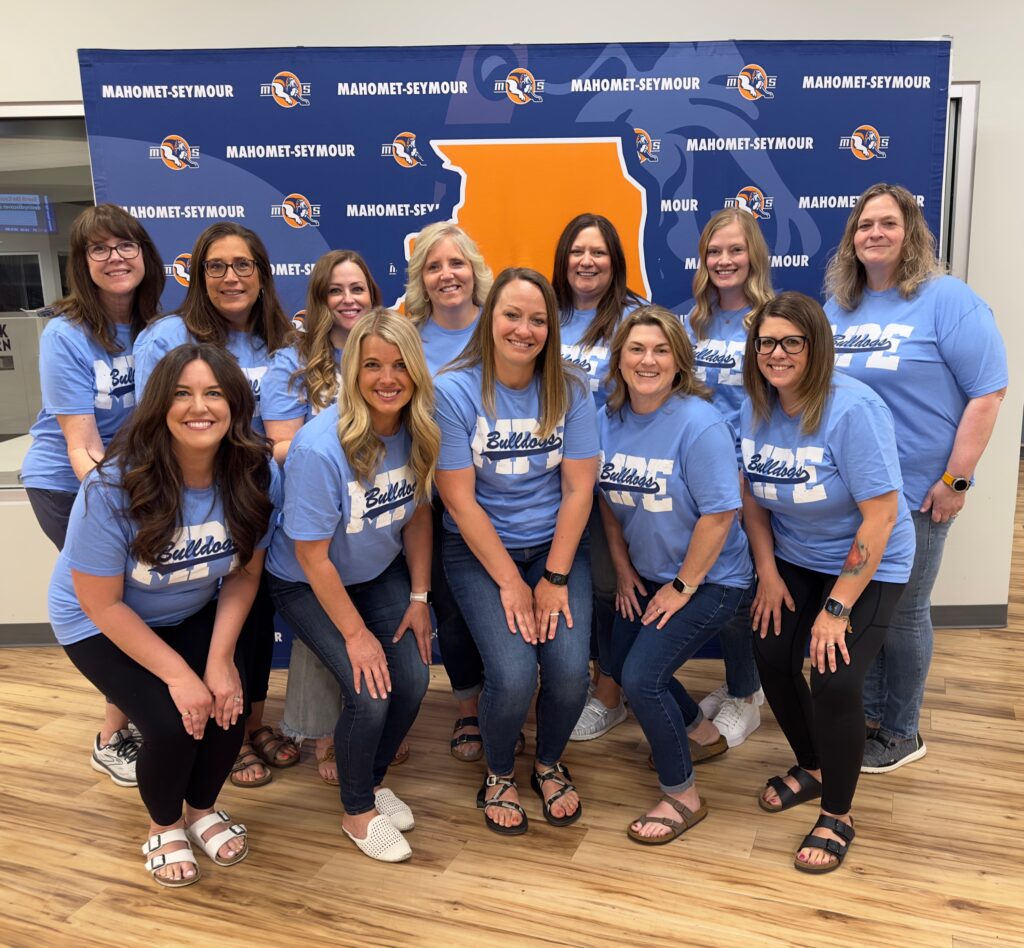By Dani Tietz
It’s true. Everything you need to know you learned in kindergarten.
For some, Robert Fulghum’s list of 16 life lessons gathered in kindergarten is a motivational poster. But for Mahomet-Seymour kindergarten teacher Julie Myers, those details that tend to get overlooked as an adult were the backbone of each school year over the last 34 years.
“In kindergarten, they learn so much,” Myer said. “They’re not only learning the academic things like how to read and write and add and subtract, but they learn life lessons, how to share and take turns and be a good friend, which are things that they’re learning in the adult world to feel like.
“They learn empathy and how to get along with others and, how to play fair and they don’t always win. These are just life lessons that we teach every day. They just come up naturally in the setting that we’re teaching, and I just hope that the students I’ve had over the years remember these little life lessons and practice them throughout their life.”
Myers’ teaching career (kind of) came to an end when the 2022-23 school year came to an end on May 20. Myers said she will continue to be a substitute teacher for the district, at least for the next couple of years.
Choosing a career in education was a natural choice for Myers. Growing up on a farm, she would teach the animals in the family barn lessons, mimicking what her grandmother, a fifth-grade teacher for 32 years, was doing in school.
“She was well respected in the community, and she was kind of a role model,” Myers said.
A graduate of the University of Illinois, Myers joined Mahomet-Seymour as a student teacher in 1989, working alongside greats like Eileen Bunting, her cooperative teacher.
“She’s just a legend,” Myers said.
Myers said working in the late 80s, and early 90s, helped her build a philosophical foundation that has carried for three decades.
Working alongside teachers 10-15 years older, Myers learned how to work day in and day out, staying late, and arriving early, to be the best teacher she could be. As one of the first faces Mahomet-Seymour parents see as their children enter public school, her colleagues taught her to communicate with the child’s caretakers.
“At this age, you kind of help the parents learn how to school too, especially if it’s their first child,” Myers said. “They have no idea about the academic part, so, they have a lot of questions. I think communicating with parents was something that I felt like those teachers taught me to do.”
Today, with grown children establishing their own lives, Myers sees how those teachers taught her about how to parent her own young children in the late 1990s, and early 2000s, and oftentimes looked at them as mother figures.
Although the educational landscape has drastically changed from 1989 to 2023, with demands on teachers increasing year after year, Myers said teachers at Middletown Prairie Elementary have not lost the focus or passion throughout the years.
“Every year I feel like I get better and better because you know more,” she said.
With 12 kindergarten classrooms at Middletown Prairie, Myers said it’s now often hard to find that time to connect on a personal level with other professionals like she’s done in the past. Many teachers work through their lunch hours now while still working those same after-school hours to prepare for upcoming units.
“We’re all dedicated hardworking teachers and I just don’t think you get that everywhere,” she said. “I’m proud of that.”

The group found time to celebrate Myers at dinner late last week. Even as teachers have come and gone over the years, being part of the kindergarten staff fills Myers with great pride.
“It’s not about the pay,” she said. “It’s about the people and just changing.”
Sometimes those lessons are instructions or a book to tell you what to do. Throughout Myers’ career, it’s been a lot of watching the women around her.
Myers remembers how hard former Middletown Prairie teacher Patti Simpson worked during her final year. She was determined to make her last year just as good as her last. When Myers approached the 2022-23 school year, she came in with that intention.
“I work just as hard last year as I did my first year, and that’s what I’m proud of too,” she said.
Spending time with her colleagues was important, but being with her students one last time was too. On Thursday she invited her students and their caretakers to Barber Park for a picnic, popsicles, and ice cream sandwiches.
“A lot of the parents were like, ‘Oh my gosh, they’ve missed you so much,’” she said.
What children experience in Myers’ classroom has been something they’ve carried with them into high school and beyond, just going to show that it’s not only what you do in this world, but how you make others feel.
“It’s all those little things that add up to their experience,” she said. “They aren’t going to remember that math lesson where they learned to add or subtract or they finally figured out that this was the number 13 instead of 31. They’re going to remember all these moments of fun and learning.”
Myers folded the academics of kindergarten into wonder for students. Everything from morning meetings, where the class organizes their day and a few students share about their lives, to field trips, Myers focused on modeling writing, storytelling, math, and science while prioritizing play and discovery.
Field trips have changed over the years. Today kindergarten students go to the zoo, but a staple at Middletown Elementary was a trip to a local restaurant where the owner would give students a sneak peek behind the business.
The classes would come back to the classroom for an immersive learning unit. Together they would brainstorm ideas for a restaurant they wanted to create: make food choices, accept jobs, then spend the next two or three weeks turning the classroom into a restaurant where peers and families came to visit.
“They would wear an apron or chef hat,” Myers remembers. “The managers and cashiers would wear a tie or a little dress. We did everything for that restaurant. It was all academic, but they didn’t realize it was so academic.”
Students were not only learning to work together to create something new, but they wrote notes and made order forms, learned restaurant etiquette, and understood ingredients and math through money.
“It was play-based kindergarten,” she said. “But they learned so much math, reading, and writing throughout this whole entire unit, and they learned about the community.
“They learned how to communicate with one another, work as a team, how to solve problems. It was fun and exciting, and I feel like that’s what school should be about.”
Over the last decade, Myers has captured her students’ imaginations as they think about spring in March, reading books about leprechauns.
To test their wit, the students engineer leprechaun traps made of straws, rope, scraps of green felt or other items donated to the classroom. The five and six-year-olds then took all the things they learned from the beginning of the unit to the end, sharing it with the class. Traps went home over spring break with students sharing pictures and writing about what happened when they weren’t looking
“It just makes them so excited.
As Myers looks back over her career, from immersive learning to Common Core standards, she is most proud of staying true to her profession, teaching.
“The pendulum swings,” she said. There are big buzzwords, we try this and do that. Then “that” goes away and then now it’s something else.
“I just wanted to stay true to what kindergarten should be should look like, keeping it developmentally appropriate. I think that is an accomplishment.
“Five and six-year-olds, I would say, need love, attention. They need to love learning, and just creating that environment every day is probably my proudest accomplishment.”
With educational gaps widening, especially between the youngest students coming into preschool or kindergarten, Myers said that elementary teachers’ jobs are becoming harder year after year.
“Every year you have this group of children that are at such different levels: academically socially, emotionally,” she said. “You have to figure out, what does this child need?
“I feel like elementary teachers really have to differentiate their instruction because it’s changing and the dynamics of the standards just keep getting larger.”
But making sure everyone gets from point A to point B, whether it’s in the hallway or in milestones, Myers’ favorite part, watching students grow has been the reward.
Recently, Myers received a gift, “Mrs. Spitzer’s Garden” by Edith Pattou.
Focusing on a wise teacher who understands that each “seed” (student) she’s given to “plant” (teach) at the beginning of the school year grows differently as they turn into “flowers.” Some seeds are bold, some are quiet, and some may even be showy or playful, but they all need soil, sunlight, and water.
After the little arms and eyes of kindergarten students move on to the first grade, it’s often hard for teachers to follow them over the years. While her focus in the classroom has been on making lasting academic gains, she takes time to capture that sentimental piece in a kindergarten time capsule that is given to each student to open as they graduate from high school.
“It’s what did you like best about kindergarten? Who were your friends? Kind of a snapshot of the year,” she said. I also include the “Everything you need to know you learned in kindergarten” poem and my address so they can connect with me.
“I’ve always had kids every year at graduation time come out of the blue. They’ll send me a text or a Facebook message and say, ‘I’m graduating and going here. I’m going to work here or live here.”
Myers reports that she even had the children of some of her former students in class or other programming.
“I don’t remember everyone, but I do try really hard to remember them,” she said. Once they tell me their name and I’m like, ‘Oh, I remember you,” and then you kind of see that kindergarten face. They’ve grown up and changed, but you still see that little five- or six-year-old in there.”
And for Myers, connections with the children of Mahomet-Seymour have been that lifelong dream come true.
“That’s the part I’m going to miss about kindergarten is just all the connections with the people and the families and my coworkers,” she said. “It’s just a job that you can fall in love with very easily.”



